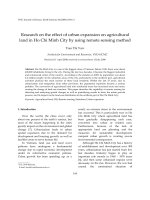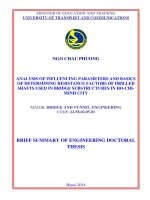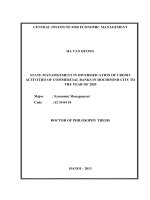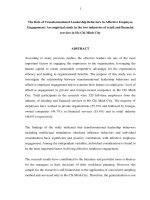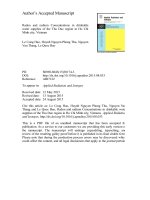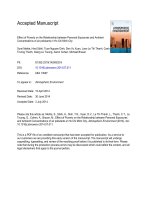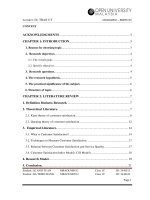ummary of the doctoral dissertation in law the legal status of accused persons under the vietnamese criminal procedure law in ho chi minh city
Bạn đang xem bản rút gọn của tài liệu. Xem và tải ngay bản đầy đủ của tài liệu tại đây (276.88 KB, 27 trang )
VIETNAM ACADEMY OF SOCIAL SCIENCES
GRADUATE ACADEMY OF SOCIAL SCIENCES
L
HUYNH THI NGOC HAN
THE LEGAL STATUS OF ACCUSED PERSONS
UNDER THE VIETNAMESE CRIMINAL
PROCEDURE LAW IN
HO CHI MINH CITY
Major: Criminal Law and Criminal Procedure Law
Major code: 9.38.01.04
SUMMARY OF THE DOCTORAL DISSERTATION IN LAW
Hanoi - 2021
The dissertation completed at Graduate Academy of Social Sciences,
Vietnam Academy of Social Sciences
Supervisor: Assoc. Prof. Dr. Tran Dinh Nha
Reviewer 1: Prof. Dr. Hồ Trọng Ngũ
Reviewer 2: Assoc. Prof. Dr. Cao Thị Oanh
Reviewer 3: Assoc. Prof. Dr. Trịnh Tiến Việt
The dissertation will be defended at Graduate Academy Level Council of
dissertation assessment at Graduate Academy of Social Sciences
Time: ………… date ………. month …… …year 2021
The dissertation may be found at:
- Vietnam National Library;
- Graduate Academy of Social Sciences Library
INTRODUCTION
1. The necessity of the research topic
Human rights are natural, inherent and objective rights of the human
beings which recognized and protected by national laws and international
legal agreements, and each person has rights because they are the people. If
people lose these rights, they are no longer human. In Vietnam, human
rights, basic rights and obligations of citizens are always respected and
guaranteed. Along with the recognition of human rights, basic rights and
obligations of citizens in the Constitution 1946, 1959, 1980, 1992, our Party
and State have enforced many policies to ensure human rights and basic
rights and obligations of citizens and has mostly participated in
international treaties of human rights. The 2013 Constitution stipulated that
“Human rights and citizen rights can only be restricted by the provisions of
the law in necessary cases for reasons of national defense, security, social
order and safety, social ethics, community health” (Clause 2, Article 14).
The accused persons are also human, however, because they are suspected
of committing a crime, they are restricted some rights by the law.
Therefore, to ensure and protect human rights of accused persons, the law
needs to specify the accused person and their legal status so that they can
exercise procedural rights and obligations that proceeding-conducting
agencies and persons could not violate and obstruct them
In terms of awareness: Currently, many countries in the world and
Vietnam also have specific provisions on the legal status of accused persons
towards respect respect and protect human rights in criminal proceedings,
when considering and resolving a criminal case the accused persons are in
the central position. They are the most important entity in the legal
relationship of criminal proceedings, or in other words, if there are no
accused persons, there will be no criminal cases, and when criminal cases
occur, criminal proceedings activities will clarify the truth of the cases on
the basis of implementing the provisions of the criminal proceedings in the
process of investigating, prosecuting, and adjudicating to prove the
accusation. This activity must right procedure, order, objectiveness,
1
properly, right person, right crime and not neglect crimes in the context of
the industrial revolution 4.0.
In terms of legislation: the legal status of accused persons is now
stipulated clearly and specifically by law, especially in the 2013
Constitution and the criminal procedure law. The important issue is how to
enforce the provisions of the law in practice to ensure and protect human
rights and citizen rights of accused persons in criminal proceedings,
demonstrating humanity, not to slander innocent people but not to neglect
crimes, and limit procedural violations in prosecuting, investigating,
hearing and executing criminal cases. Although the Vietnamese criminal
procedure law has legally created the premises, conditions, mechanism and
measures to inspect and supervise criminal proceedings activities of
proceeding-conducting agencies and persons, namely, Investigation Agency
and People’s Procuracy, the People's Court, and judicial titles, facilities for
legal proceedings. In recent years, however, Vietnam’s criminal
proceedings still reveal many limitations, the rights of accused persons are
not guaranteed. There are still unjust cases in some countries due to
objective and subjective reasons, especially short-sighted legal thinking and
misunderstanding of the law, arbitrary application of legal provisions in
verifying, investigating, prosecuting and hearing when proceedingconducting persons usually towards accusation and negative prejudices of
society against the accused persons.
In practice, Ho Chi Minh City (HCMC) has the largest number of
lawyers (accounting for 40% of the country’s lawyers), many lawpracticing organizations (accounting for one third of the whole country).
Although there are many favorable conditions for the lawyer's practice, by
2020, HCMC’s goal is to have over 50% criminal cases being judged by the
Court with lawyer’s participation but has not yet reached for now. Some
lawyers have not been proactive and active in self-studying and updating
legal knowledge to improve their professional skills as well as improving
political, ethical and behavioral qualities. In addition, some lawyers do not
have responsibility for their work, and enthusiasm to their clients, they are
2
just interested in remuneration but disregard their practice quality. This has
greatly affected the legal status of accused persons in HCMC.
In terms of justice and the protection of human rights: To ensure the
procedural status of accused persons, it is necessary to have a direct
mechanism to protect the criminal procedural rights and obligations of the
accused persons. In addition to the legal content stipulates the accused
person’s rights and obligations along with the rights and obligations of the
proceeding-conducting agencies and persons, but in order to achieve the
highest efficiency, it is necessary to have further specific provisions on
methods and limits for accusers and accused persons perform their rights
and obligations without infringing upon each other’s rights. At the same
time, there is a solution to consolidate the organization, facilities and means
of work and detention of proceeding-conducting agencies and lawpracticing organizations in a modern and professional manner and to meet
promptly legal services for subjects (especially the accused persons);
ensuring the quantity and quality of lawyer forces.
Determining the legal status of accused persons is very important not
only resolve a criminal case but also protect their legitimate rights and
interests. When referring to the legal status of a subject, it not only refers to
the legal rights and obligations of the subject, but also the way of
implementing the subject’s rights and obligations. In practice, however,
guaranteeing and protecting the legal status of accused persons is not
sometimes really paid attention in theoretical studies and application of the
law. Although there have been so far many works that have clarified the
rights and obligations of the accused persons on the basis of researching the
provisions of the criminal procedure law, human rights, citizen rights of the
accused persons in the criminal proceedings, but they do not pay attention
to the principle of the rights of one party to be obligations of other party and
vice versa so as to examine the relationship among subjects in criminal
proceedings. In fact, the application of criminal procedure law shows that
the law has fully provided the rights of subjects participating in the
proceedings but has not specifically stipulated obligations of proceeding3
conducting subjects to meet those rights. According to the author, studying
the legal status of accused persons not only arising from their rights and
obligations but need further examine its correlation with the rights and
obligations of proceeding-conducting agencies and persons. This is the way
so that the accused persons perform their rights and obligations, as well as
activities of the proceeding-conducting agencies and persons, and the
competent persons when implementing criminal law and policies.
Additionally, there are still big gaps in applying criminal procedure law and
policies on ensuring human rights and procedural rights of accused persons
nationwide in general and in HCMC in particular. Theoretically and
practically, it is necessary to examine to find out the causes and propose
solutions to further improve criminal procedure law to guarantee human
rights and procedural rights when the accused persons are considered
without crime until proven by legal order and having the Court’s conviction
that took legal effect. With such reasons, it is necessary to examine
systematically theoretical and practical issues on “The legal status of
accused persons under the Vietnamese criminal procedure law in HCMC”.
2. Research purpose and tasks
2.1. Research purpose
Based on theory, regulations and the criminal procedure law
enforcement on the legal status of accused persons, the dissertation seeks to
examine and assess comprehensively the legal status of accused persons
under the Vietnamese criminal procedure law over the years in HCMC. The
dissertation findings contribute to building and perfecting the criminal
procedure law, propose solutions, mechanisms of guaranteeing and
protecting human rights of the accused persons to effectively implement
their legal status in criminal procedure in Vietnam in general, and in HCMC
in particular.
2.2. Research tasks
First, the study seeks to analyze and explain theoretical issues on the
rights and obligations of accused persons under the Vietnamese criminal
procedure law, it then distinguishes the legal status of each type of accused
4
persons from other criminal procedure subjects and proceeding participants.
Studying methods and measures to implement the rights and obligations of
accused persons is shown by examining activities of proceeding-conducting
agencies, proceeding-conducting persons and proceeding participants to
clarify the concept, nature, subjects, rights and obligations of the accused
persons under the Vietnamese criminal procedure law; criminal policies,
procedural functions, procedural models to ensure the rights and obligations
of accused persons under the Vietnamese criminal procedure law; to
explain factors affecting the implementation of criminal policies, procedural
functions, procedural models to ensure the rights of accused persons under
the Vietnamese criminal procedure law, in which the role of lawyers and
defendant’s agent.
Second, the dissertation tries to analyze and evaluate the reality of
applying criminal policies, criminal laws and criminal procedures for
guaranteeing and protecting the rights of accused persons under the
Vietnamese criminal procedure law in HCMC to find out the causes,
limitations and shortcomings as a basis for proposing solutions to
strengthening the legal status of accused persons.
Third, the study builds and completes a system of solutions to improve
efficiency of the implementation of the rights and obligations of accused
persons under the Vietnam’s criminal procedure law nowadays.
3. Research subject and scope
3.1. Research subject
The research subject of the dissertation is the rights and obligations of
accused persons, methods and measures to implement the rights and
obligations of accused persons in three aspects including reasoning, real law
and implementation in practice, and applying the criminal procedure law for
the accused persons in HCMC.
3.2. Research scope
The dissertation analyzes and explains theoretical and practical issues on
the rights and obligations of accused persons under the Vietnamese criminal
procedure law. It then distinguishes the legal status of the accused persons
5
from proceeding-conducting subjects and proceeding participants. By
examining activities of proceeding-conducting agencies, proceedingconducting persons and proceeding participants, the dissertation analyzes
methods, measures of implementing the rights and obligations of accused
persons to clarify concept, nature, subjects, rights and obligations of the
accused persons under the Vietnamese criminal procedure law.
The dissertation seeks to examine, make statistics, and survey the reality
of regulations and enforcement of criminal procedure law on the legal status
of accused persons in HCMC. It also points out limitations and propose
solutions to improve the criminal procedure law. These solutions contribute
to implementing effectively the legal status of accused persons in Vietnam
in general, and in HCMC in particular.
- Regarding time: for legal documents, the dissertation mainly analyzes
and evaluate regulations of Criminal Procedure Code 1988, 2003 and 2015,
and legal documents.
- Regarding administrative documents: statistical reports of law
protection agencies, law enforcement agencies in HCMC.
- Regarding survey data: the study tries to synthesize, analyze, evaluate
and compare date from 2009 to 2019.
- Spatially: HCMC.
4. Methodology and research methods
4.1. Methodology
The dissertation based on methodology of dialectical materialism,
historical materialism of Marxism-Leninism and Ho Chi Minh's thought on
the State and Law, human rights and citizen rights in relation to state power,
judicial reform, and rule-of-law-state.
4.2. Research methods
- Direct research method through actual survey, direct contact and
exchange with researchers, people in charge and research in the field of
politics and law.
6
- Indirect research method by synthesizing and analyzing documents,
especially the primary documents, comparing research matters among
selected subjects.
- Research approach based on the mode of enforcing the rights.
Accordingly, the study of accused persons in Vietnamese criminal
proceedings through prosecution-based approach as a legal measure to
exercise human rights, or more specifically, not only research on concept of
accused persons, what do they have rights, but need to pay attention to the
mechanism so that proceeding-conducting persons could enjoy full rights and
strictly complying with obligations. The approach based on the exercise of
procedural rights is also the dialectical approach in a common relationship
between the parties, the rights and obligations of this party will be the rights
and obligations of other party, respectively. In practice, proceedings will
specify which agency and individual has the responsibility and obligation to
ensure these rights of the accused persons, explaining why the law gives
many rights for the accused persons but cannot implement. Since then, we
could find out problems, obstacles and resolve them in practice
To address the research tasks, the study utilizes multidisciplinary and
interdisciplinary approach to the following specific research methods:
- Chapters 1 and 2: Using analysis, synthesis and comparison methods to
build the concept of accused persons and their rights and obligations in the
Vietnamese criminal proceedings, the bases for determining the legal status
of accused persons, namely:
+ Summarizing experience and scientific knowledge of pervious
research works to make evaluation in the study so that the dissertation
associates with reality and it has a higher scientific value.
+ Conducting practical surveys to assess the reality of guaranteeing the
rights and obligations of accused persons as well as other issues related to
ensuring the accused person’s rights, obligations and powers of proceedingconducting agencies, proceeding-conducting persons. The surveys are
conducted in HCMC, and then the study synthesizes, compares, analyzes
data, and conclude relevant contents.
7
- Chapter 3: The author uses the method of analysis, criminal statistics,
exchanges with experts, and consulting their knowledge, experiences to
clarify the legal status of accused persons in relation to the procedural
subjects. Contents related to the guarantee and enforcement of the rights of
accused persons, the role and responsibility of the criminal proceedings
system throughout the criminal proceedings, in which, it emphasizes
activities of proceeding-conducting agencies, proceeding-conducting
persons and proceeding participants including procurators, procuracies,
judges, people's jurors, defendant’s agents and other proceeding participants
who directly affect the legal status of accused persons, namely:
+ Collecting data on annual reports of agencies in HCMC such as The
Procuracy, Court, Legal Committee of the People's Council, People's
Committee, Judicial Reform Steering Committee and so on to analyze the
reality of guaranteeing the rights and obligations of accused persons, as
well as enforcing the rights, responsibilities, and obligations of the
proceeding-conducting agencies and persons.
+ Selecting and analyzing some typical cases to learn and evaluate the
perception of competent individuals in proceedings and participate in the
proceedings over the rights of the accused persons, evaluation of
mechanism and conditions to ensure the rights of accused persons in
HCMC.
- Chapter 4 mainly utilizes the synthetic method, scientific forecasts
about the trends and requirements to ensure the legal status of the accused
persons, thenceforth, it proposes solutions to consolidate and strengthen the
legal status of the accused persons.
5. New contributions of the dissertation
The dissertation not only examines and explains the rights and
obligations of the accused persons from the provisions of the law and legal
application in practice, but also puts the accused person’s legal status into
the system of criminal law policy, criminal procedure law, combining
comparison, evaluation and propose suitable solutions and mechanism to
ensure the rights and obligations of the accused persons under the
8
Vietnamese criminal procedure law. In addition, the study examines the
concept of accused person, their legal status under the 2015 Criminal
Procedure Code, and practice of proceeding-conducting agencies,
proceeding-conducting persons and proceeding participants to detect
shortcomings, obstacles while applying criminal law, criminal procedure
law. Thenceforth, it clearly identifies the role and functions of accusation,
defense and hearing, as well as responsibilities of proceeding-conducting
agencies, proceeding-conducting persons must implement properly the law
so that the accused persons could exercise their rights without being
obstructed or infringed upon.
6. Theoretical and practical significance of the dissertation
The research findings of the dissertation can be seen as reference for
researching theoretical issues of the legal protection agency and protection
of human rights. By examining and analyzing theoretical basis and
mechanism to ensure the enforcement of the rights and obligations of
accused persons under the Vietnamese criminal procedure law, the
dissertation may be a valuable material source for the state agencies,
lawmakers in their works. The dissertation’s conclusion and
recommendation are the theoretical and practical basis. Thus, organizations
and individuals, especially lawyers, defenders could refer it to protect the
accused persons, and having positive effects on proceeding-conducting
agencies, proceeding-conducting persons and proceeding participants while
implementing criminal law and criminal procedure law.
7. Structure of the dissertation
Besides the introduction and conclusion, and references, the dissertation
includes 4 chapters:
Chapter 1: Literature review
Chapter 2: Theoretical issues on the legal status of accused persons
Chapter 3: The reality of the provisions on the legal status of accused
persons and practice of enforcing law in HCMC
Chapter 4: Recommendation and solutions to ensure the legal status of
accused persons
9
Chapter 1
LITERATURE REVIEW
1.1. Domestic research situation
1.1.1. Research works relating to theoretical basis
1.1.1.1. Relating to criminal policy
1.1.1.2. Relating to procedural functions
1.1.1.3. Relating to procedural model
1.1.1.4. Relating to human rights, citizen rights and defense rights
1.1.2. Research works examine overview of the 2015 Criminal
Procedure Code relating to the dissertation’s contents
1.2. Foreign research situation
The content can be learned selectively to further improve the criminal
justice system and criminal procedure law in Vietnam in the direction of
ensuring human rights and the rights of accused persons in criminal
procedure.
1.3. Assessing research situation and the issues that need to be
examined in the dissertation
1.3.1. The debating issues
Human rights of the accused and convicted persons is natural, so the law
mainly regulates obligations, restrictions and how to regulate legally. What
are measures to protect the accused persons, there should be specific
regulations on the concept of accused persons to determine procedural
status and it is also a measure to conduct human rights. Whether the legal
status of accused persons is guaranteed or not when strengthening the
application of other measures, in addition to custody, equality of rights and
obligations between accuser and accused person.
1.3.3. The issues need to be further examined
From the practice of criminal procedure in HCMC to propose solutions
to strengthen the legal status of accused persons, in which, emphasizing the
role of accuser, have strict regulations on legal status of accuser is one of
the measures to protect human rights and citizen rights of the accused
persons, the role and responsibility of the elected bodies, avoid making
10
pressure over investigation agency, Procuracy, Court or weakening the
Court’s independence, ensuring the law’s seriousness, respecting the
judiciary’s jurisdiction so as to find out objective truth of the case, not
making unjust and missing crimes. Guaranteeing the legal status of accused
persons to define an adequate limit for the accusers and accused persons are
equal in organizational structure, qualifications, compliance with the law.
1.4. Theoretical basis and research methods
1.4.1. Research questions
To address the research tasks, the dissertation tries to answer the
following questions:
What are theoretical issues and the provisions of the law to ensure the
legal status of accused persons under the Vietnamese criminal procedure
law?
How is the reality of enforcing the law on the legal status of accused
persons under the Vietnamese criminal procedure law in HCMC and factors
affecting the implementation process?
What are the requirements and solutions to ensure the legal status of
accused persons and how should they be implemented?
1.4.2. Research theories
The dissertation based on the theoretical system of Marxist-Leninist
philosophy; Ho Chi Minh Thought; views and guidelines of the Party and
State on criminal policy and judicial reform in Vietnam in the period 2002 2020. Clarifying the provisions of the criminal procedure code 2015 (CPC
2015) on the legal status of accused persons; the relationship between
accused persons and other subjects in the proceedings is also an important
basis to address the research tasks of the dissertation.
1.4.3. Research hypothesis
In order to further improve the CPC 2015 as well as implementing
effectively regulations, the dissertation examines the legal status of accused
persons (arrestees, detainees, defendants (Article 58, 59, 60, 61 of the CPC
2015) is greatly influenced by the legal status of other procedural subjects,
especially the legal status of the competent persons. Proposal: The CPC
11
should consider the detainees in emergency as the accused persons so that
they could ask accusers since they are in the investigation agency at the
time the Procuracy does not have detention decision over the detainees.
Requirements and solutions to ensure the enforcement of rights, obligations
and legal status of the accused persons under the Vietnamese criminal
procedure law in HCMC.
Summary of chapter 1
By reviewing literature, previous research works have provided
scientific theories, thereby the author continues to explain issues related to
the research topic, namely:
First, examining characteristics and connotation of accused persons and
it provides the concept of accused persons and explains theoretical basis of
the legal status of accused persons, why there are differences among types
of accused persons.
Second, examining the reality of the provisions and practice of enforcing
rights and obligations of the arrestees, detainees, defendants in relations to
the proceeding-conducting subjects and other proceeding participants. Since
then, detecting the shortcomings, inadequacies and suitable points in
applying criminal procedure law.
Third, on the basis of the research findings, the dissertation proposes
some recommendation and solutions to ensure the legal status of accused
persons.
12
Chapter 2
THEORETICAL ISSUES ON THE LEGAL STATUS OF ACCUSED
PERSONS
2.1. The concept, characteristics of the legal status of accused
persons
2.1.1. Status and legal status
The legal status of accused persons (commercial natural or legal
persons) is associated with the provisions of criminal liability and criminal
prosecution for accused persons to be the most clearly demonstrated
through the Criminal Procedure Law. The legal status of accused persons
not only the legal basis for identifying and distinguishing rights and
obligations of accused persons in each stage of criminal procedure, but also
a way for accused persons to exercise their legal rights and obligations and
showing the relationship with other legal subjects. In order to determine the
legal status of accused persons, it is necessary to identify who are the
accused persons and their legal status.
2.1.2. The legal status of accused persons
In my opinion: “The accused persons are commercial individuals or
legal persons who are suspected by competent authorities perform some
acts or to commit crimes and they may be imposed coercive measures of
criminal procedure or other criminal procedure measures to investigate,
prosecute and hearing in accordance with the CPC of Vietnam”.
Accordingly, the law recognizes that individuals and legal persons are
considered the accused persons if they have signs of committing crime to
determine their legal rights, interests and obligations when participating in
the proceedings as well as the way of conducting the proceedings. The
author would like to introduce the concept of the legal status of accused
persons: “The legal status of accused persons is their position in the
criminal proceedings mechanism expressed by determining their
procedural rights and obligations in each stage of criminal proceedings”.
From the concepts mentioned above, we can classify the accused persons to
13
examine their procedural rights and obligations in each stage of criminal
proceedings since they are accused until issuing judgement.
2.1.2.1. The arrested person
“The arrested person is an individual offender or to be wanted, arrestee,
defendant by the decision of the competent persons or approved by the
People’s Procuracy to investigate, prosecute and hearing in accordance with
the Vietnamese criminal procedure law”.
2.1.2.2. Detainees
In the author’s opinion: “Detainees are persons to be held in custody to
verify their crime sign under the Vietnamese criminal law and criminal
procedure law”.
2.1.2.3. Defendants
In the author’s opinion: “Defendants are individuals or representatives of
commercial legal person having objective legal grounds enough to prove
they might commit a crime and were criminally prosecuted by the
provisions of the Vietnamese criminal law and criminal procedure law”.
2.1.2.4. Accused
In the author’s opinion: “The accused is the person to be adjudicated at
the trial in accordance with the Vietnamese criminal law and criminal
procedure law”.
2.1.2.5. Accused persons under 18 years of age
The Vietnamese Criminal Procedure Code divided accused persons into
full-time enrolment of 14 years of age or more and full-time enrolment of
16 years of age or more corresponding to each level of liability, ensuring
friendly proceedings and consistent with psychology, age and perception of
accused persons under 18 years old.
2.1.2.6. Accused persons are commercial legal persons committing
crimes.
Legal person who is subject to criminal prosecution to be only “commercial
legal person is suspected committing dangerous acts to society that the Penal
Code defines as a crime and might be criminally liable to that acts.
14
2.2. Distinguishing accused persons from other criminal proceedings
subjects
2.2.1. Distinguishing proceeding-conducting agencies from
proceeding-conducting persons
2.2.2. Distinguishing defendant’s agent from other proceeding
participants
2.3. The basis for determining the legal status of accused persons
2.3.1. Social basis
The legal status of the criminal procedure subject must be considered in
the specific legal relationship with other criminal procedure subjects and in
the common relationship with other subjects.
2.3.2. Political - ideological basis
Being a profound source that directly affects the process of forming the
Criminal Procedure Law, demonstrating the nature of the law and the unity
of rights and obligations to stabilize the society, protecting and encouraging
the development of new social relations.
2.3.3. Constitutional basis
The basis for forming the positive law is the artificial product of
civilization, representing the powerful will of the State created by man, and
expressed by the legal norms and codes. Its existence and effect are
determined by the powerful entity.
2.3.4. Traditional of criminal justice criminal procedure law policy
Criminal justice activity means exercise of state power and a set of
specific actions performed by judicial agencies in criminal procedure that
are directly related to resolving criminal cases properly.
2.3.5. International legal standards on human rights of accused
persons and regulations on the legal status of accused persons in some
countries
Summary of chapter 2
On the basis of the methodology of dialectical materialism and Ho Chi
Minh's thought on the law, this chapter has clarified a number of theoretical
issues on the legal status of accused persons, including: content,
15
characteristics, concepts, rights and obligations related to the legal status of
accused persons. Distinguishing the accused persons from other criminal
procedure subjects and the basis for determining the legal status of accused
persons. Accusation is a state agency activity or a competent person in
accordance with the law to prosecute criminal liability (offenders must be
criminally responsible for their acts) to people who commit dangerous acts
to society stipulated by the Penal Code. Since accusation until the state’s
judgment or decision to a specific subject, they have become a accused
person (may be individual or legal person), since then there is a relation
between accused person and the state authority, the rights of one party are
the obligations of other party and vice versa. The content of accusation
tends to prove the accused person has committed a crime or not. The form
of accusation is shown by the order, procedures under the law that the
subjects apply for proving accusation against the accused subject. The
content and form of the accusation have a dialectic relationship to find out
objective truth and determining the legal status of criminal procedure
subject, especially determining the legal status of accused persons in each
state of criminal procedure. At the same time, it also proves why not only
arrested, detained, internees and defendants are the accused persons but also
someone is detained in an emergency when competent authorities detain
people without Procuracy’s decision but accused by the state.
16
Chapter 3
THE REALITY OF THE PROVISIONS ON THE LEGAL STATUS
OF ACCUSED PERSONS AND PRACTICE OF ENFORCING
LEGAL STATUS OF ACCUSED PERSONS IN HO CHI MINH CITY
3.1. The reality of the legal status of accused persons in HCMC
3.1.1. Overview of crime situation between 2009 and 2019 in HCMC
3.1.2. The legal status of accused persons before 2015
3.1.3. The legal status of accused persons under the the 2015 Penal Code
3.2. Practice of enforcing legal status of accused persons in HCMC
3.2.1. The legal status of accused persons in the stage of investigation
and prosecution
The rights of accused persons are still difficult to guarantee, so it is
necessary to have participation of defendant’s agent. The legal status of
detainees in emergent case, in terms of content, the law provides their rights
and obligations like the accused persons, but in term of the form, the 2015
CPC has not recorded the detainees in emergent case to be the accused
persons.
3.2.2. Legal status of accused persons in the stage of prosecution
The Procuracy is the competent agency to oversee judicial activities,
including investigation and adjudication of the Court. The application of
non-custodial measures is still limited. Therefore, it is very necessary to
have an external inspection and supervision mechanism for the activities of
the Procuracy when exercising its right to prosecute and supervise judicial
activities.
3.2.3. The legal status of accused persons in the trial stage
3.2.3.1. First-instance trial
The operation of the two-level city People's Courts is also limited and
their performance is not high. Lack of advocate listening leading to
“confrontation” but no longer “confrontment” to find out the objective truth
of the case.
3.2.3.2. Appellate trial
17
Superior Court judges with higher qualifications and experience will
promptly detect mistakes or shortcomings in assessing evidence and
applying law of lower Court judges, on the other hand, this also shows the
advocate’s role in ensuring the objectivity of the case.
3.2.3.3. Cassation and retrial
Guaranteeing two levels of hearing including cassation and retrial to
protect the legitimate rights and interests of accused persons.
3.2.4. Applying the law for offenders under 18 years of age
Currently, the law does not have specific sanctions to ensure the quality
of the advocate when participating in criminal procedure, so sometimes it is
only form affecting the legitimate rights and interests of accused persons
under 18 years old.
3.2.5. Applying the law for commercial legal persons committing
crimes
Relevant regulations have not been applied very much in HCMC
3.3. Limitations and shortcomings in exercising the legal status of
accused person and the causes
In the stage of the investigation, the legal status of detainees in an
emergency, in terms of content, the law stipulates their rights and
obligations like the arrested person, but in terms of form, the 2015 CPC has
not recorded detainees in emergent case to be the accused persons.
The concept of litigation has recently been used popularly, so some
proceeding-conducting persons do not fully understand the nature of the
litigation, not reporting against themselves to be considered opposing and
not honestly declaring.
The advocates are not really taken seriously. They are the key to open
the door to all rights and responsibilities of accused persons. It is clear that
both the criminal law and criminal procedure are complex issues and it is
often confusing without the advocate’s participation.
Summary of chapter 3
In fact, the exercise of criminal procedure law in HCMC shows that the
legal status of accused persons in each state of criminal procedure is
18
different. In order for the criminal procedure system reaches high
effectiveness, each criminal procedure subject, proceeding participants must
understand their own rights and obligations. From positive impact of Article
31 of the 2013 Constitution leading to the breakthrough approach specified
in Article 13 of the 2015 CPC is the principle of innocence - a very
important principle determining the legal status of accused persons were
officially recorded in the CPC. At the same time, on the basis of studying
the legal status of accused persons in relations with agencies and
proceeding-conducting persons, and other proceeding participants have
identified the responsibility of ensuring the rights and obligations of
accused persons to be investigation agencies, Procuracy, the people’s court
at all levels, followed by the participance of other proceeding subjects such
as victims, witnesses, appraisers, valuators; the supervisory role of
individuals and organizations under the elected bodies such as the National
Assembly, People's Councils at all levels, the Front and its member
organizations; and the role of other state agencies. In particular, the role of
advocates, first of all, lawyers who are professionally trained to defense
their clients in accordance with the Criminal procedure law and the law of
lawyers, and representatives of criminal procedure participants, the rules of
litigation is guaranteed in the trial, but in fact, the activities of the lawpracticing organization have not met the requirements and have not been
paid attention. Although the law has specific provisions, due to
misunderstanding, the implementers have not applied properly such
provisions leading to violation in prosecuting, investigating, and hearing.
Chapter 4
RECOMMENDATION AND SOLUTIONS TO ENSURE THE
LEGAL STATUS OF ACCUSED PERSONS
4.1. Recommendation to secure the legal status of accused persons
4.1.1. Respecting and protecting human rights, individuals’ legitimate
rights and interests
Ensuring bodily inviolable rights: it is necessary to quickly and fully
equip facilities for recording and recording images when taking testimony
19
of accused persons, be aware of the presence of advocate in the stage of
taking testimony is to ensure human rights of the accused persons, the
agencies and proceeding-conducting persons must properly realize that the
accused persons still have human rights, and they are only limited some
rights stipulated by the CPC.
4.1.2. Ensuring the legitimate rights and interests of accused persons
The right to defend the accused person: It is very necessary to stipulate
the presence of advocate since the detainee has appeared in the
investigation agency headquarters, and conditions for the advocate
participate in the proceedings since the investigation agency has received
the detainee in emergency cases.
The right to protect personal life, health, honor, dignity, and property: It
is necessary to change the name of accused persons into “suspecters” to
remind and eliminate prejudice that the accused persons are “guilty
persons”
4.2. Solutions to protect the legal status of accused persons
4.2.1. Legal solutions
- Recognizing the accused persons' right to silence as a separate
principle
- Stipulating a mechanism to exclude the accused persons provide false
testimony.
- Stipulating a mechanism to increase other measures in addition to
custody.
- Recognizing the detainees in emergency case as accused persons
4.2.2. Organizational solutions
4.2.2.1. For the proceeding-conducting subjects
- Stipulating clearly rights and obligations of the proceeding-conducting
subjects.
- Strengthening coordination among proceeding-conducting agencies.
- Completing activities of the family courts and minors.
4.2.2.2. For other proceeding participants
20
The proceeding-conducting agencies must really respect the rights of
advocate.
4.2.3. Other solutions
- Developing and improving the capacity of lawyers to meet the
requirements of participating in proceedings, legal advice, and legal aid.
- Strengthening propaganda and education to raise awareness of
complying with the law.
Summary of chapter 4
Criminal Procedure Law is a system of relevant legal documents of a
country to prevent and fight against individuals and organizations
committing crimes. When mentioning the legal status of accused persons
also includes p procedural rights and obligations of the accused persons.
The accused persons are always in weak position in the criminal procedure,
so the protection of their legitimate rights and interests is always paid
special attention and examined, especially the completion of legal
provisions and reviewing whether the CPC has recorded the legal grounds
to protect them or not. At the same time, it is also necessary to pay attention
to the CPC has stipulated the rights and obligation respectively to the
proceeding-conducting agencies forcing parties comply with. The legal
status of accused persons cannot be independent but must be placed in the
dialectical relations with the legal status of the proceeding-conducting
agencies and persons. The criminal law and criminal procedure have
sufficient and strict regulations on institutions and provisions is only a
necessary condition, the most important issue is the mechanism, method
and means to effectively implement such regulations. As such, this has just
effectively improved the law application. Determining the legal status of the
proceeding-conducting subjects and proceeding participants to form a
unified body and increasingly develop.
21
CONCLUSION
From many perspectives, the legal status of accused persons under the
Vietnamese criminal procedure law today is specifically stipulated; the
regulations arise from personal and social interests, and harmoniously
combined, consistent with requirements, political tasks, social development
and in the context of international integration. The legal rights and interests
of accused persons are increasingly clearly and strictly defined by law,
demonstrating civilization, humanitarian, educational, and ensuring legal
basis to protect the legal status of accused persons. By applying the law in
practice to further adjust criminal law and criminal procedure to meet social
standards and fighting against crimes.
Accused persons are normal people but the proceeding-conducting
agencies have suspected them committing crime, so their rights are limited
and they must comply with such restriction. Human rights of accused
persons in each procedural stage is different due to measures to limit such
their rights. The rights and obligations of proceeding-conducting agencies,
proceeding-conducting persons is that they must verify, prosecute,
investigate, prosecute, hearing to prove crimes by order, procedure of the
criminal procedure law to clarify objective truth of criminal cases and
hearing right person, right crime. The rights and obligations have stipulated
in the CPC creating the legal status of the parties in relations of criminal
procedure law, dialectical relations, and interact with each other in a
complete system of criminal procedure.
The accusation process is reflected in the investigation agency’s results
and indictment of Procuracy, the accused persons are always in a weak
situation so they need the role of advocates to protect their legitimate rights
and interest. When the law considers accused persons to be not guilty or in
other words, as suspecters, the advocates must also have high qualification
corresponding to accusers. Guaranteeing the right to advocate of accused
22
person make an important contribution to ensuring the rights to legal
proceedings, the legal status of accused persons and it is also a legal
measure to carry out human rights of the accused persons.
To guarantee and protect the legal status of accused persons, it is
necessary to have strict regulations of criminal procedure law. In fact, the
criminal procedure process requires that when applying the criminal
procedure law, must consider the legal status of accused persons in relations
with authorized subjects, or more specifically, the way of implementing the
rights and obligations of accused persons in relations with the rights,
obligations and responsibilities of the proceeding-conducting agencies and
persons. This is a sufficient condition to protect human rights, citizen rights
of the accused persons in practice. The law should also give the concept
emphasizes that the accused persons are suspecters only, thus include
detainees in emergencies; emphasizing human rights of accused persons but
due to the law suspects that they have committed crimes, they are limited
some rights and imposed by some coercive measures. The accused persons
comply with obligations is also one of the conditions for implementing their
rights, the legal status of accused persons will include their rights and
obligations and the way of implementing such rights and obligations, it is
operation of the proceeding-conducting agencies, proceeding-conducting
persons based on the provisions of the CPC. Creating a complete
mechanism to guarantee the legal status of accused persons, especially this
mechanism must have the equality of organization, strong competencies,
compliance with the law of all criminal procedure subjects.
With limited theoretical knowledge and the dissertation’s limitation, we
try to survey, analyze, make statistics and clarify the theoretical and
practical issues on the legal status of accused person under the Vietnamese
criminal procedure law in HCMC, thenceforth, the study propose
recommendation and solutions to improve the law and mechanisms to
23

